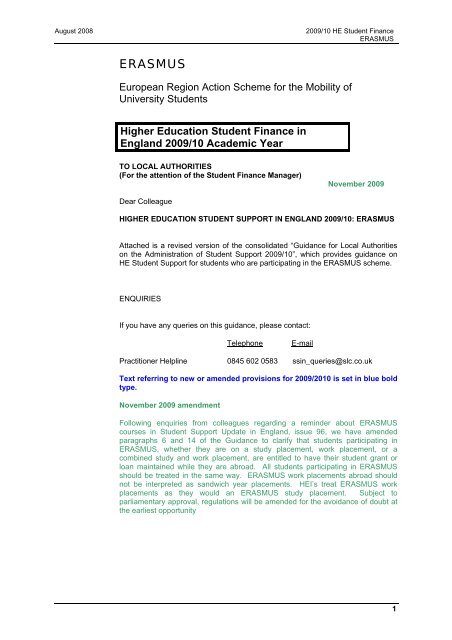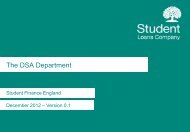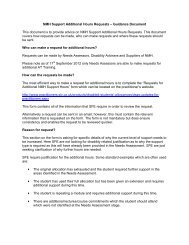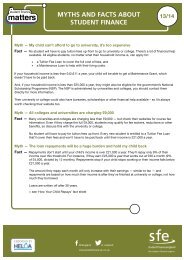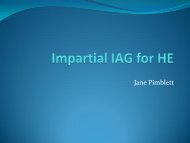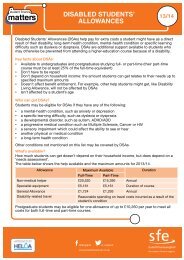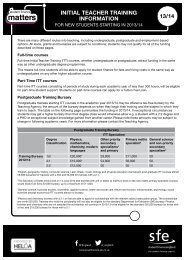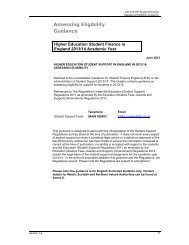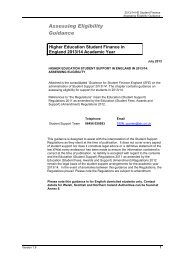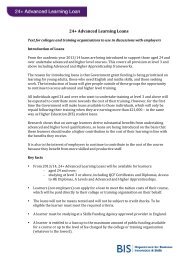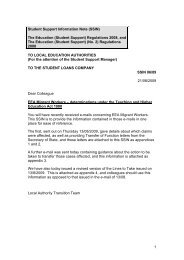ERASMUS Guidance 2009/2010 (90 kB) - Practitioners
ERASMUS Guidance 2009/2010 (90 kB) - Practitioners
ERASMUS Guidance 2009/2010 (90 kB) - Practitioners
Create successful ePaper yourself
Turn your PDF publications into a flip-book with our unique Google optimized e-Paper software.
August 2008<br />
<strong>2009</strong>/10 HE Student Finance<br />
<strong>ERASMUS</strong><br />
<strong>ERASMUS</strong><br />
European Region Action Scheme for the Mobility of<br />
University Students<br />
Higher Education Student Finance in<br />
England <strong>2009</strong>/10 Academic Year<br />
TO LOCAL AUTHORITIES<br />
(For the attention of the Student Finance Manager)<br />
November <strong>2009</strong><br />
Dear Colleague<br />
HIGHER EDUCATION STUDENT SUPPORT IN ENGLAND <strong>2009</strong>/10: <strong>ERASMUS</strong><br />
Attached is a revised version of the consolidated “<strong>Guidance</strong> for Local Authorities<br />
on the Administration of Student Support <strong>2009</strong>/10”, which provides guidance on<br />
HE Student Support for students who are participating in the <strong>ERASMUS</strong> scheme.<br />
ENQUIRIES<br />
If you have any queries on this guidance, please contact:<br />
Telephone<br />
E-mail<br />
Practitioner Helpline 0845 602 0583 ssin_queries@slc.co.uk<br />
Text referring to new or amended provisions for <strong>2009</strong>/<strong>2010</strong> is set in blue bold<br />
type.<br />
November <strong>2009</strong> amendment<br />
Following enquiries from colleagues regarding a reminder about <strong>ERASMUS</strong><br />
courses in Student Support Update in England, issue 96, we have amended<br />
paragraphs 6 and 14 of the <strong>Guidance</strong> to clarify that students participating in<br />
<strong>ERASMUS</strong>, whether they are on a study placement, work placement, or a<br />
combined study and work placement, are entitled to have their student grant or<br />
loan maintained while they are abroad. All students participating in <strong>ERASMUS</strong><br />
should be treated in the same way. <strong>ERASMUS</strong> work placements abroad should<br />
not be interpreted as sandwich year placements. HEI’s treat <strong>ERASMUS</strong> work<br />
placements as they would an <strong>ERASMUS</strong> study placement. Subject to<br />
parliamentary approval, regulations will be amended for the avoidance of doubt at<br />
the earliest opportunity<br />
1
August 2008<br />
<strong>2009</strong>/10 HE Student Finance<br />
<strong>ERASMUS</strong><br />
Table of Contents<br />
Introduction ............................................................................................................3<br />
Policy.......................................................................................................................3<br />
What is <strong>ERASMUS</strong> ......................................................................................3<br />
Work placements under the <strong>ERASMUS</strong> scheme ..........................................3<br />
Fee support for <strong>ERASMUS</strong> students .............................................................3<br />
Full-year <strong>ERASMUS</strong> ...................................................................................3<br />
Part-year <strong>ERASMUS</strong> ..................................................................................4<br />
Students from elsewhere in the EU ............................................................5<br />
Living costs support (grants and loans) .........................................................5<br />
Travel grant ....................................................................................................6<br />
The financial assessment ..............................................................................6<br />
Application of the household contribution ......................................................6<br />
Administration ........................................................................................................6<br />
Annex 1....................................................................................................................8<br />
LIST OF COUNTRIES IN THE <strong>ERASMUS</strong> SCHEME ...................................8<br />
2
August 2008<br />
<strong>2009</strong>/10 HE Student Finance<br />
<strong>ERASMUS</strong><br />
Introduction<br />
1. This guidance looks at the particular eligibility criteria for students who are<br />
undertaking a period abroad as part of their course under the <strong>ERASMUS</strong><br />
scheme. References to regulations relate to the Education (Student<br />
Support)(No,2) Regulations 2008 (SI 2008 No. 1582).<br />
2. The main eligibility criteria can be found in the guidance on ‘Assessing<br />
Eligibility’.<br />
3. Portal guidance relating to <strong>ERASMUS</strong> study can be found in the<br />
Administration section of this chapter.<br />
Policy<br />
What is <strong>ERASMUS</strong><br />
4. <strong>ERASMUS</strong> is the higher education strand of the Lifelong Learning European<br />
Education programme funded by the European Commission. The main aim<br />
of Erasmus is to promote the mobility of students, teachers and academic<br />
staff throughout Europe through a system of partnerships between<br />
universities and colleges in the 31 countries currently participating in the<br />
scheme. Certain other non-EU countries are also included in the <strong>ERASMUS</strong><br />
programme. A full list of the countries taking part in the <strong>ERASMUS</strong> scheme<br />
can be found at Annex 1. LAs will wish to note that Switzerland is not a part<br />
of the <strong>ERASMUS</strong> scheme.<br />
5. <strong>ERASMUS</strong> study periods are for a minimum of three months and a full<br />
academic year (at least 24 weeks excluding weekends and the usual<br />
vacations). <strong>ERASMUS</strong> study periods cannot take place in the first year of<br />
study but can take place in any year of study after that. LAs should note that<br />
under new arrangements students may be allowed more than one<br />
<strong>ERASMUS</strong> grant during a course.<br />
Work placements under the <strong>ERASMUS</strong> scheme<br />
6. Some students may participate in a work placement or part study/part work<br />
placement abroad under the <strong>ERASMUS</strong> scheme. It does not matter whether<br />
periods of work experience are paid or unpaid. LAs should be aware that<br />
the <strong>ERASMUS</strong> scheme allows for periods of ‘stand alone’ work placement<br />
of up to 12 months’ duration in the host country provided that the periods of<br />
work placements are organised and given credit by the host institution; and<br />
are recognised by the home institution. Students who participate in the<br />
<strong>ERASMUS</strong> scheme, whether on a study or a work placement abroad,<br />
should be treated in the same way. Work placements abroad on<br />
<strong>ERASMUS</strong> are not sandwich year placements.<br />
Fee support for <strong>ERASMUS</strong> students<br />
Full-year <strong>ERASMUS</strong><br />
7. The position of students taking part in the Lifelong Learning exchanges is<br />
unique. The arrangements are intended to operate mainly on a reciprocal<br />
basis. The rules of the scheme are such that students cannot be charged<br />
tuition fees by the receiving institution. UK students on <strong>ERASMUS</strong><br />
exchanges are not required to pay the fees of incoming EU <strong>ERASMUS</strong><br />
students.<br />
3
August 2008<br />
<strong>2009</strong>/10 HE Student Finance<br />
<strong>ERASMUS</strong><br />
8. The tuition fee waiver, or concession, for full-year UK outgoing <strong>ERASMUS</strong><br />
students is provided for in regulation 25(4) for old-system students and<br />
regulation 20(2) for current-system students. Old-system students are<br />
not eligible for LA assessed fee support for any academic year in which they<br />
are participating in the <strong>ERASMUS</strong> scheme and all the periods of study<br />
during that year are at an institution outside the United Kingdom. Such<br />
students are not required to make a contribution towards their tuition fees.<br />
Similarly, current-system students who spend a full academic year<br />
abroad under the <strong>ERASMUS</strong> scheme will not be charged tuition fees<br />
by their institution and are not eligible for a tuition fee loan. This is the<br />
case regardless of the subject of study. Instead, the Higher Education<br />
Funding Council for England (HEFCE) compensates institutions via the<br />
block grant for the loss in fee income from such students. Similar provision<br />
is made for students whose courses are at institutions in Scotland, Wales<br />
and Northern Ireland. Since 2003/04, HEFCE's compensation arrangements<br />
have been based on actual numbers of outgoing students. This means that<br />
institutions who have boosted their numbers receive additional funding,<br />
while those who have experienced a decline receive less.<br />
The tuition fee waiver, or concession, is not available to all students who<br />
take part in the <strong>ERASMUS</strong> scheme.<br />
Students for whom the tuition fee waiver applies:<br />
• old-system students who, but for their full year on <strong>ERASMUS</strong>, would<br />
otherwise be eligible for a grant for fees under regulation 25 of the<br />
student support regulations;<br />
• old-system students who, but for their full year on <strong>ERASMUS</strong>, would<br />
otherwise be eligible for a grant for fees under regulation 25 but are<br />
liable for 100% contribution towards their tuition fees under the income<br />
assessment contribution; and<br />
• current-system students who, but for their full year on <strong>ERASMUS</strong>,<br />
would otherwise be eligible for a tuition fee loan under regulation<br />
20 of the student support regulations.<br />
Students for whom the tuition fee waiver does not apply:<br />
• old-system students who are not eligible for a grant for tuition fees<br />
under regulation 25 and current-system students who are not<br />
eligible for a tuition fee loan, because of previous study;<br />
• students who are not eligible for any student support under the student<br />
support regulations, for example, because they do not meet the<br />
residence criteria.<br />
The fees for these students are set by institutions themselves and it is for<br />
the institution concerned to determine what fees a student in this situation<br />
should pay.<br />
Part-year <strong>ERASMUS</strong><br />
9. The <strong>ERASMUS</strong> tuition fee waiver only applies to eligible students who study<br />
for a full academic year abroad under the <strong>ERASMUS</strong> scheme (including any<br />
periods of work experience under the scheme and regardless of the subject<br />
of study). The definition of a complete academic year for this purpose is at<br />
least 24 weeks (excluding weekends and the usual vacations). Within the<br />
rules of the <strong>ERASMUS</strong> scheme, students cannot spend a full year abroad if<br />
it is spread across two different academic years.<br />
4
August 2008<br />
<strong>2009</strong>/10 HE Student Finance<br />
<strong>ERASMUS</strong><br />
10. Old-system students who spend a year abroad which spans two academic<br />
years may be liable for an income-assessed contribution for the full rate<br />
tuition fee of £1,285 in the first academic year and the half rate tuition<br />
fee of £640 in the second academic year (regulation 31(2)). Currentsystem<br />
students might be charged variable fees of up to £3,225 in the<br />
first academic year and £1,610 in the second academic year<br />
(regulation 24(3)).<br />
11. Old-system students who go abroad only for part of a year under the<br />
Erasmus arrangements will be liable for an income-assessed contribution of<br />
£1,285 towards tuition fees, £640 where the periods of full-time study at the<br />
home institution are in aggregate less than 10 weeks. Current-system<br />
students can be charged variable fees of up to £3,225, £1,610 where<br />
the periods of full-time study at the home institution are in aggregate<br />
less than 10 weeks. Students who are abroad for a whole academic year<br />
but only part of that year is under the <strong>ERASMUS</strong> scheme are liable for an<br />
income-assessed contribution of up to £640 towards their tuition fees if<br />
they are an old-system student, or could be charged variable fees of<br />
up to £1,610 if they are a current-system student.<br />
12. Please refer to the guidance in the chapter on ‘Assessing Eligibility’ for<br />
students, including language assistants, who spend a period abroad, which<br />
is not under the <strong>ERASMUS</strong> scheme.<br />
Students from elsewhere in the EU<br />
13. Students from elsewhere in the EU studying at a UK HEI and eligible for<br />
fees support from England and taking part in the <strong>ERASMUS</strong> scheme are<br />
eligible for the tuition fee concession in the same way as UK students.<br />
Living costs support (grants and loans)<br />
14. There are no special provisions in the student support regulations for the<br />
assessment of living costs support (grants and loans) for students<br />
undertaking a period abroad under the <strong>ERASMUS</strong> scheme. Such students<br />
should be considered for grants and loans for living costs in the usual way,<br />
and treated in the same way regardless of whether they participate in an<br />
<strong>ERASMUS</strong> work placement or an <strong>ERASMUS</strong> study placement, depending<br />
on whether they are an old- or current-system student.<br />
15. Regulation 38 sets out the general qualifying conditions specific to grants<br />
for living and other costs. These are:<br />
• students from elsewhere in the EU who are not EEA migrant workers or<br />
the spouse or child of an EEA migrant worker, are not eligible for living<br />
costs grants; except in the cases of those students meeting the<br />
conditions of the EU directive as detailed in the Education (Student<br />
Support) Regulations <strong>2009</strong>, and those students meeting the conditions<br />
of the Bidar judgement;<br />
• students in receipt of an income-assessed NHS Bursary are not eligible<br />
for living costs grants;<br />
• students on a course for the initial training of teachers where the periods<br />
of full-time attendance are in aggregate less than 6 weeks, are not<br />
eligible for living costs grants; and<br />
• students on a sandwich course where, in the academic year in question,<br />
the periods of full-time study are in aggregate less than 10 weeks, are<br />
not eligible for living costs grants.<br />
5
August 2008<br />
<strong>2009</strong>/10 HE Student Finance<br />
<strong>ERASMUS</strong><br />
Travel grant<br />
16. Where <strong>ERASMUS</strong> students meet the eligibility criteria for travel grant under<br />
regulation 52, they shall be eligible for a grant equal to such reasonable<br />
expenditure which they are obliged to incur within or outside the United<br />
Kingdom for the purpose of attending, as part of their course, an overseas<br />
institution. The first £303 of such expenditure is disregarded when<br />
determining the amount of travel grant due.<br />
17. LA’s have responsibility for assessing eligibility for and entitlement to the<br />
grant. It is therefore for LAs to determine whether expenditure is<br />
reasonable. However, in determining whether expenditure is reasonable,<br />
LAs should not take into account students’ income from other sources such<br />
as <strong>ERASMUS</strong> grant, for example. The student’s contribution depends on<br />
the household income which is determined in accordance with paragraph 3<br />
of Schedule 4 to the Regulations and is applied to grants and loans in<br />
accordance with regulation 98 for old-system students, regulation 100<br />
for current-system students, as described below and in the chapter on<br />
‘Assessing Financial Entitlement’.<br />
The financial assessment<br />
18. Paragraph 4 of Schedule 4 to the regulations provides for the calculation of<br />
students’ income by reference to ‘taxable income’. Any payments made to<br />
students under the <strong>ERASMUS</strong> scheme shall be disregarded when<br />
determining students’ income because such payments are non-taxable.<br />
Application of the household contribution<br />
19. For old-system students on a full-year <strong>ERASMUS</strong> scheme who are not<br />
eligible for tuition fee support under regulation 25(4), the household<br />
contribution is reduced by a notional £1,285 before the contribution is<br />
applied to any grant for dependants, then the portion of the student loan<br />
subject to income assessment and finally, any travel grant (regulation<br />
98(5)). For current-system students the household contribution is<br />
applied in full first to any grant for dependants, then the incomeassessed<br />
portion of the student loan and lastly, any travel grant<br />
(regulations 97 and 100).<br />
20. Old-system students who spend part of the year abroad under the<br />
<strong>ERASMUS</strong> scheme and who are liable for an income-assessed<br />
contribution of up to £640 towards their tuition fees should have any<br />
remaining unspent contribution reduced by a notional £640 before this<br />
is applied to dependants grant, student loan and travel grant (regulation<br />
98(4)).<br />
21. See the chapter on ‘Assessing Financial Entitlement’ for further information<br />
on the calculation of the student or household contribution and its<br />
application to the assessed student support.<br />
Administration<br />
22. Where a student indicates in Section 4i of the PN1, or Section 3j of the PR1<br />
‘About Your Course, and your College or University’ that they have been<br />
accepted onto the <strong>ERASMUS</strong> exchange scheme the system will flag the<br />
application status as ‘Pending LA manual assessment’.<br />
23. As stated above at paragraph 5, <strong>ERASMUS</strong> study periods cannot take<br />
place in the student’s first year of study.<br />
6
August 2008<br />
<strong>2009</strong>/10 HE Student Finance<br />
<strong>ERASMUS</strong><br />
24. Students need to have taken at least one year of prior study to be eligible.<br />
25. Therefore, LAs should be careful to check the validity of an indication on<br />
form PN1 (and any PR1 form completed by a first year student in error),<br />
either paper or on-line, that the student will be taking part in the <strong>ERASMUS</strong><br />
scheme. Form PN1is most likely to have been submitted by a prospective<br />
first year student.<br />
26. The LA assessment officer will be required to validate (Validate Evidence<br />
Screen) that appropriate evidence/information has been received from the<br />
student’s HEI and is satisfactory.<br />
27. The Assessment Summary screen will display a message for the LA<br />
assessment officer to check the information shown on the screen.<br />
Generally, the rules engine will return an assessment to show that tuition<br />
fees are not payable (as these are funded through <strong>ERASMUS</strong>). The value<br />
of loan shown will depend on the student’s circumstances.<br />
28. Using information provided by the student, it is the responsibility of the LA<br />
assessment officer to determine the student’s entitlement, check the<br />
entitlement result returned by the rules engine, edit and amend fields where<br />
appropriate and resubmit to the rules engine.<br />
29. Refer also to the LA Portal System User Guide Section 12 ‘Performing the<br />
Assessment’ which explains automated, semi-automated, manual<br />
assessment and using the assessment summary screen.<br />
30. General guidance on the administration of student support for students,<br />
including <strong>ERASMUS</strong> students, can be found in ‘<strong>Guidance</strong> on General<br />
Eligibility and Financial Assessment Administration’.<br />
7
August 2008<br />
<strong>2009</strong>/10 HE Student Finance<br />
<strong>ERASMUS</strong><br />
Annex 1<br />
LIST OF COUNTRIES IN THE <strong>ERASMUS</strong> SCHEME<br />
All member states of the EU participate in the <strong>ERASMUS</strong> scheme. These are:<br />
Austria<br />
Belgium<br />
Bulgaria<br />
Cyprus<br />
Czech Republic<br />
Denmark<br />
Eire<br />
Estonia<br />
Finland<br />
France<br />
Germany<br />
Greece<br />
Hungary<br />
Italy<br />
Latvia<br />
Lithuania<br />
Luxembourg<br />
Malta<br />
Netherlands<br />
Poland<br />
Portugal<br />
Romania<br />
Slovakia<br />
Slovenia<br />
Spain<br />
Sweden<br />
United Kingdom<br />
<strong>ERASMUS</strong> also includes the EU accession country (Turkey) and the European<br />
Economic Area (EEA) countries (Iceland, Liechtenstein and Norway).<br />
NOTE: Switzerland is not a part of the <strong>ERASMUS</strong> scheme.<br />
8


